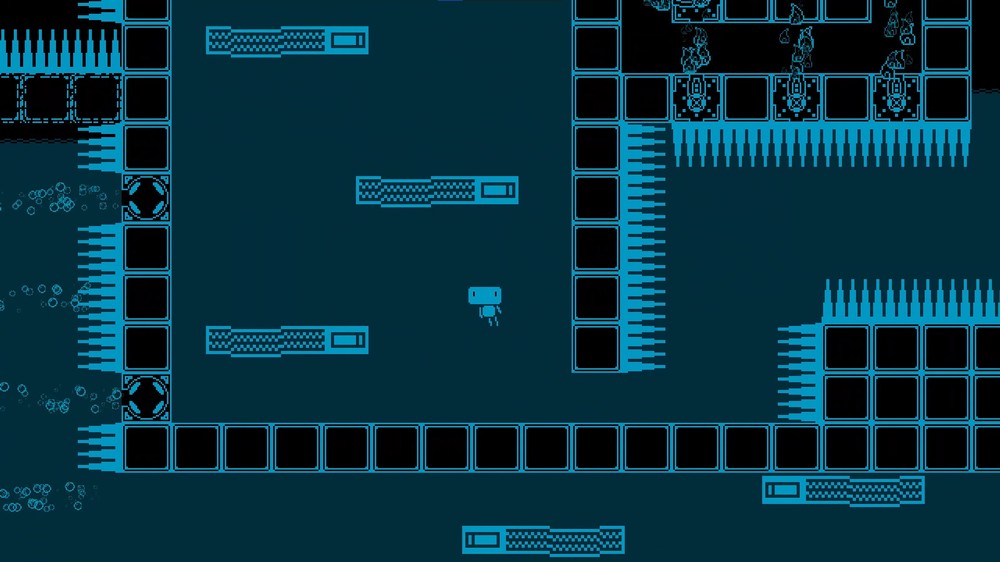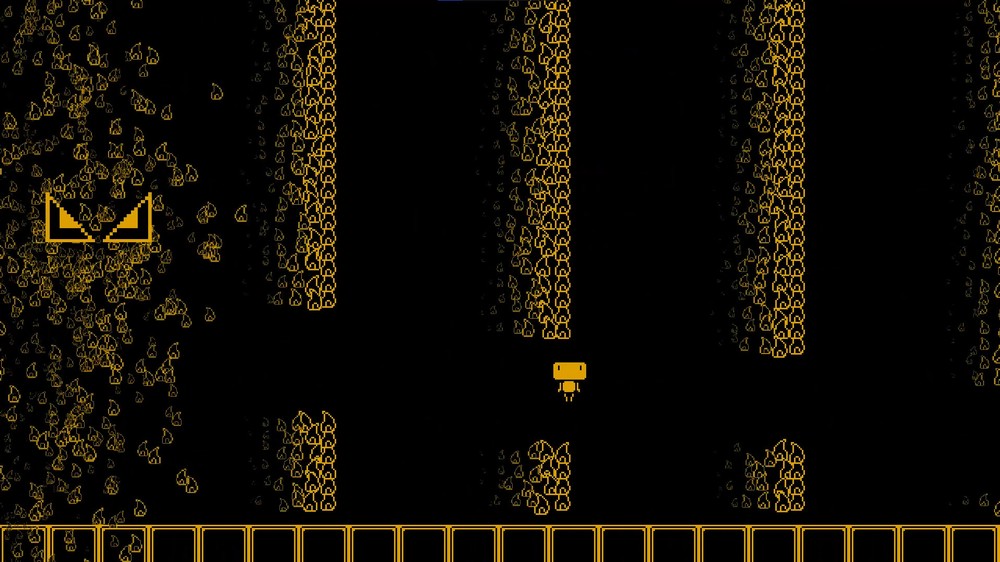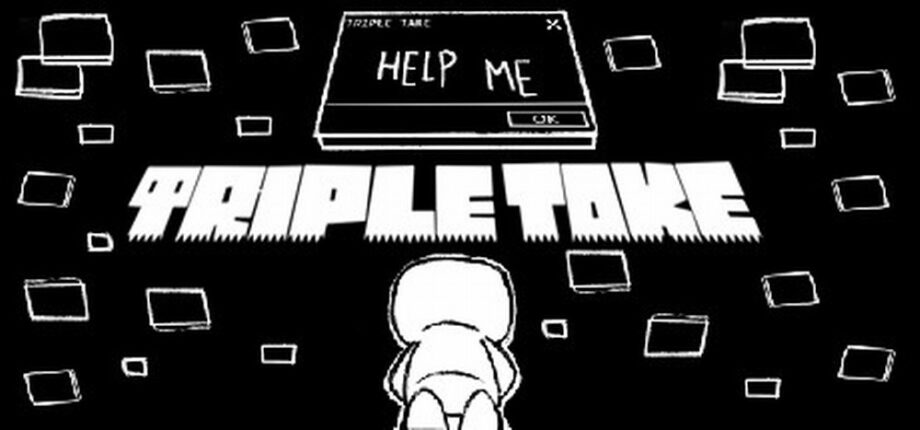Just one more run and then I’ll write the review. I have been saying this most of today. I am totally hooked on Triple Take, the 2D precision platformer from FlyAway games. Triple Take’s hook is that you play each stage 3 times. At the start of a level, you’ll jump and climb your way to the finishing flag. Each time you play the stage it becomes increasingly more difficult. I thought this was a great way to ease the player through some of the more challenging levels. You’ll play your way through this world stage by stage seeking to set free a captive who seeks to overthrow the machine that has imprisoned him there. Furthermore, at the end of each world is a boss battle that is a clever mix up of thematic mechanics and the part of “the program” you are fighting.
 Each “world” will lead to a new set of stages where you’ll meet side characters who color in the world and help build context to the current stage of the game. The writing is good and never overstays its welcome. Soon after starting, you’ll encounter the “ghost in the machine” character who is trapped in the game’s program and recruits you to help him break out. These sequences always have some reality-bending and breaking the 4th wall that I thought was genuinely creative and hadn’t seen done before. Your game window will move around the screen, or you’ll have to hunt for a file in the system’s folder to try to put it back into an appropriate spot. It was always making me chuckle and never was too distracting from the core loop of wanting to see how many levels I could beat.
Each “world” will lead to a new set of stages where you’ll meet side characters who color in the world and help build context to the current stage of the game. The writing is good and never overstays its welcome. Soon after starting, you’ll encounter the “ghost in the machine” character who is trapped in the game’s program and recruits you to help him break out. These sequences always have some reality-bending and breaking the 4th wall that I thought was genuinely creative and hadn’t seen done before. Your game window will move around the screen, or you’ll have to hunt for a file in the system’s folder to try to put it back into an appropriate spot. It was always making me chuckle and never was too distracting from the core loop of wanting to see how many levels I could beat.
The art design is retro 8-bit, NES-style games with a soundtrack to match. It’s charming and boiled down. This art design feels especially mechanical when the game breaks the 4th wall and addresses you the player. It’s a great effect, and I loved when I was pushed back to a fake error box telling me that the “other” had found me, and we were in danger. It pushes the psychological horror angle in a spooky and fun way.
 The mechanics took me a while to wrap my head around. While I’ve been trained to have much more forgiving controls in platformers, I think there is a method to the madness of Triple Take. For the first handful of hours playing, I was moving very slowly through wall-jumps and could clearly see that wasn’t the intent of the game design. It wasn’t until I realized I was not holding the button down long enough that I realized I was much more precise with my wall jumps. This could have been avoided if there had been a bit more forgiveness in the controls. Likewise, the jump pads take precise timing. This isn’t a bad thing and I felt was totally fair when I was able to grapple with what the game wanted me to do. I never felt like any of my deaths weren’t earned and that’s what’s important in games like this.
The mechanics took me a while to wrap my head around. While I’ve been trained to have much more forgiving controls in platformers, I think there is a method to the madness of Triple Take. For the first handful of hours playing, I was moving very slowly through wall-jumps and could clearly see that wasn’t the intent of the game design. It wasn’t until I realized I was not holding the button down long enough that I realized I was much more precise with my wall jumps. This could have been avoided if there had been a bit more forgiveness in the controls. Likewise, the jump pads take precise timing. This isn’t a bad thing and I felt was totally fair when I was able to grapple with what the game wanted me to do. I never felt like any of my deaths weren’t earned and that’s what’s important in games like this.
You’ll want to go back and retrieve the collectibles on each level. There’s no real penalty for dying which helps make it feel like you’re not losing any progress. I did have a hiccup syncing save data from the cloud with my Steam Deck that set me back a bit, but I assume that will be patched. Furthermore, as of right now the game is not deck-verified. That being said it is mostly playable on deck with the exception one of the challenges to locating a file within the documents folder. The instructions are for a Windows-based machine, and I had to do that one on my tower rather than with the Deck. I probably spent 50 percent of my time on the Steam Deck and 50 on my desktop.
 The game runs great and I didn’t have any hiccups. Which, I would expect so from a game with these graphics and simple mechanics. The only real criticism I have is if there could be an alternate control scheme that felt a little more traditional to other platformers of this genre or if there was more of a tutorial around the wall-jumping mechanic.
The game runs great and I didn’t have any hiccups. Which, I would expect so from a game with these graphics and simple mechanics. The only real criticism I have is if there could be an alternate control scheme that felt a little more traditional to other platformers of this genre or if there was more of a tutorial around the wall-jumping mechanic.
In short, Triple Take is outstanding. I have had a blast with this challenging and creative game that tests my muscle memory and grit by daring me to try just one more time. The formula of try, die, and try again is so addicting. When the gameplay is mixed with the meta-narrative of a “ghost in the machine” that you are assisting in breaking out, it’s hard to put down. The stages and art design are simple, but the core mechanic of running and jumping feels great once you get the hang of it. While it may take a little time to get your jumping legs beneath you, it’s well worth the current asking price of $5.59 on Steam. If you at all enjoy games like 2019’s Celeste, you should jump in headfirst.











